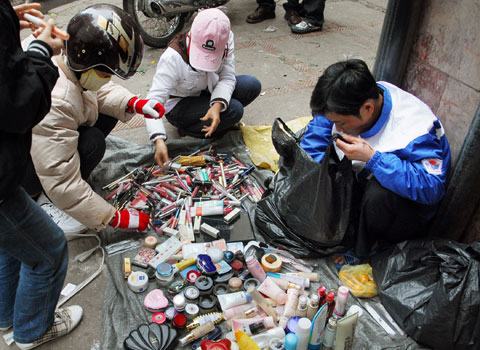Risk of skin cancer from some cosmetics
Many scientists have warned that using cosmetics containing formaldehyde toxins will be factors that lead to skin cancer.
In Vietnam, skin cancer ranks 8th out of 10 most common types of cancer. Data at the Hanoi Cancer Hospital show that the number of cases of skin cancer has an average rate of 100,000 people with 2.9 - 4.5.
Difficult to detect skin cancer caused by cosmetics
Several studies have shown that there are many causes of skin cancer, which are more common than exposure to ultraviolet rays in the sun. Ultraviolet rays through the skin damage living cells, breaking the gene in skin cells. Another reason is the use of cosmetics containing formaldehyde and 1.4 dioxane toxins.
According to Prof. Dr. Tran Van Sung, Chairman of the Scientific Council of the Institute of Chemistry, Vietnam Academy of Science and Technology: 'Formaldehyde is considered to be very active and aggressive. When entering the body, formaldehyde acts with enzymes, enzymes, mutagenic proteins that alter cell structure, causing a cancer-causing gene to break.
Dr. Nguyen Sy Hoa, Deputy Director of the National Institute of Dermatology said: 'The Institute receives 50-60 cases of skin and mucosal cancer each year. However, at this time, patients with skin cancer have not been detected '.

Using cosmetics of unknown origin can cause skin cancer.Photo: Duc Long
There are no clear conclusions because according to specialist doctor Nguyen Thanh, Head of the Department of Examination, National Institute of Dermatology: 'Clinical manifestations of skin cancer due to cosmetic use, and UV radiation are similar. together. While studies related to skin cancer due to cosmetic use are inadequate, it is difficult to see the difference of skin cancer due to the use of cosmetic products other than sun cancer skin.
Risk of skin damage
According to Prof. Dr. Tran Van Sung, formaldehyde is used by cosmetic manufacturers in products because of its anti-rot and anti-mold effects. And 1.4 dioxane is a solvent commonly used in shampoo, shower gel. Although it does not cause cancer, 1,4 dioxane is a poison, and when used as a solvent in combination with formaldehyde, it makes the substance penetrate the body faster.
'Even if shampoo and shower gel are only effective on the skin, but because the skin has proteins, formaldehyde will quickly penetrate, then penetrate into the body. The skin is not scratched, too , ' GS Sung warned.
According to American standards and ASEAN Cosmetics Association, for formaldehyde, the safe content is not exceeding 1,000ppm (1,000mlg / liter) for oral care products and 2,000 ppm (2,000mlg / liters) for other cosmetics. With 1.4 dioxane, these countries are not allowed to use in cosmetics over 350ppm (350mlg / liter).
According to the Drug Administration of Vietnam, at this time, no cosmetic products have been detected with the content of formaldehyde exceeding the permitted limit. However, Professor Sung said: 'Users should be cautious in using chemicals for bathing, shampooing, and beauty. Do not abuse the use of chemicals. Avoid direct contact, and be especially careful with unidentified cosmetics. '
The most common sign of skin cancer is an abnormal change in the skin, for example: a sore, bleeding, crusting and healing, then ulceration right back to this position. This sign may appear slowly, slowly developing but may also appear suddenly. In addition, there are signs such as: suddenly increasing the number and size, changing the color of moles, freckles, and short spots in a short time; bleeding or a burning sensation in moles, freckles, and spots . Most skin cancers cause changes in a localized skin area. Therefore, when there are signs of suspicion, patients need to go for early examination because skin cancer causes less pain and is often subjective.
- Women who use brown cosmetics are at risk of infertility
- Where do men have to use their own cosmetics?
- Cheap food reduces the risk of skin cancer by 17%
- Risk of skin cancer from summer day game 'sunburn tattoo'
- Viagra can double the risk of skin cancer
- Instructions on how to distinguish the most real and fake cosmetics
- This color granule can prevent skin cancer
- Australia will conduct a comprehensive study of skin cancer
- The risk of serious allergies from cosmetics
- Warning signs of skin cancer that you cannot see with the naked eye
- Be careful when using cosmetics
- Dangerous skin cancer from habit of using deodorant roller
 Why is Australia the country with the highest cancer rate in the world while Vietnam ranks 100th?
Why is Australia the country with the highest cancer rate in the world while Vietnam ranks 100th? New drug causes cancer to 'starve'
New drug causes cancer to 'starve' Common cancers in men
Common cancers in men America's incredible discovery: The most feared cancer cell is love
America's incredible discovery: The most feared cancer cell is love